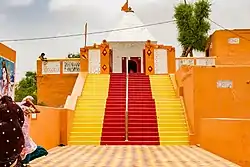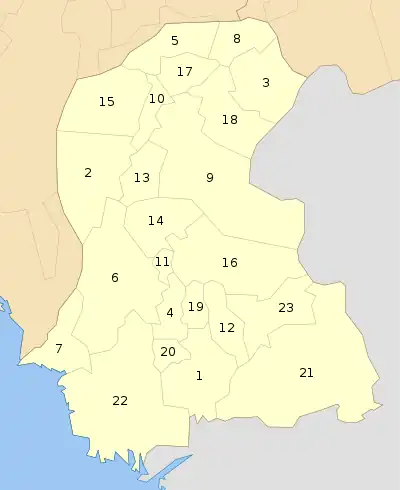Umerkot District
Umerkot District (Dhatki: عمرکوٹ / عمرڪوٽ, Sindhi: عمرڪوٽ ضلعو, Urdu: ضلع عمرکوٹ), also known as Amarkot District, is a district in the Sindh province of Pakistan. The city of Umerkot is the capital of the district. Sindhi is the native language of approximately 93.4% of the residents according to the 2017 Pakistan Census.[2] Umerkot is the only non-Muslim majority district in Pakistan, with adherents of Hinduism representing 52.2% of the total population.[3]
Umerkot District
Amarkot District | |
|---|---|
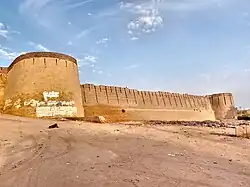 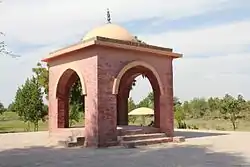 | |
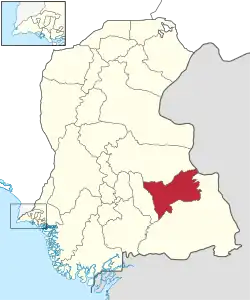 Map of Sindh with Umerkot District highlighted | |
| Coordinates: 25°22′12″N 69°43′48″E | |
| Country | |
| Province | |
| Division | Mirpur Khas |
| Headquarters | Umerkot |
| Number of Tehsils | 4 |
| Government | |
| • Type | District Administration |
| • Deputy Commissioner | N/A |
| • District Police Officer | N/A |
| • District Health Officer | N/A |
| Area | |
| • Total | 5,608 km2 (2,165 sq mi) |
| Population (2017)[1] | |
| • Total | 1,073,469 |
| • Density | 190/km2 (500/sq mi) |
| Time zone | UTC+5 (PST) |
| Website | www |
History
Akbar was born in Umerkot Fort when his father Humayun was fleeing from the Suris. After the 1843 invasion by Charles Napier, Sindh was divided into provinces and was assigned a Zamindars, also known as Wadaras, to collect taxes for the British.
Administration
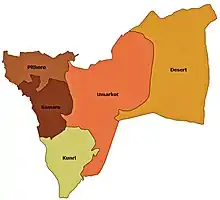
The district is administratively subdivided into the following Tehsils:[4]
Demographics
| Year | Pop. | ±% p.a. |
|---|---|---|
| 1972 | 265,683 | — |
| 1981 | 383,018 | +4.15% |
| 1998 | 664,797 | +3.30% |
| 2017 | 1,073,469 | +2.55% |
| Sources:[5] | ||
At the time of the 2017 census, Umerkot district had a population of 1,073,469, of which 243,537 (22.69%) lived in urban areas. Umerkot had a sex ratio of 929 females per 1000 males and a literacy rate of 35.07%: 48.36% for males and 20.87% for females.[1]
Religion
| Circle | Hindus | Muslims | Others |
|---|---|---|---|
| Kunri | 50.47% | 47.66% | 1.87% |
| Pithoro | 45.13% | 54.47% | 0.40% |
| Samaro | 51.36% | 48.48% | 0.16% |
| Umerkot | 54.53% | 45.27% | 0.20% |
Umerkot is the only Hindu majority district in Pakistan. Hindus form around 51% and Muslims form around 48% of Umerkot's population.[3] In 1965, about 80% of the district's population were Hindus and 20% were Muslims. The Hindu population declined due to the migration of Hindus to India. Muslims are in the majority only in Pithoro taluk.[6]
The Umarkot Shiv Mandir in Umerkot is one of the oldest and most sacred Hindu temples in the Sindh. The annual Maha Shivratri celebration of the temple is one of the biggest religious festivals in Pakistan and is attended by around 250,000 people.[7]
List of Dehs
The following is a list of Umerkot District's dehs, organised by taluka:[8]
- Umarkot Taluka (90 dehs)
- Aahir East
- Ahori Chore
- Ashabo
- Banhyari
- Behrai Thar
- Belo Karna
- Bhodar
- Chelari
- Chore Thar
- Chundawah
- Debo
- Dhorosirin
- Dingralo
- Dinore
- Diyatbah
- Doodhar
- Dugoo
- Gamoori
- Gapno
- Gorsar
- Harh
- Hasisar
- Horingo
- Janhero Pat
- Janhero Thar
- Juneja
- Kacholi
- Kaith
- Kalri
- Kaplore
- Karna
- Khalrai Thar
- Kharoro Jagir
- Kharoro Pat
- Kharoro Thar
- Khejrari
- Khiral
- Khirohi
- Khunhar
- Kunar
- Kunjeli
- Lalabah
- Laplo
- Larh
- Lashari
- Makhyaro
- Mandhal
- Marwah
- Mehparo
- Mokhal Bah
- Muhammad Aalam Palli
- Nabisar Thar
- Narhadi
- Noonhyoon
- Okkaro
- Old Chore/Chore Purano
- Padrio
- Panjoi
- Parhyaro
- Rabario
- Rajar Thar
- Rajari Thar
- Sabhri Pat
- Sabrhi Thar
- Sabo
- Sadoori Pat
- Sadoori Thar
- Sahib Tar
- Sarangsar
- Sarreti
- Senhoi Thar
- Shakh Khejrari
- Shekhro
- Sidhore
- Sonhari
- Sonpur
- Soofi
- Soonhin
- Tal
- Tangore
- Tar Samoon
- Tebhri
- Thathrai
- Timo Mitho
- Umerkot Pat
- Umerkot Thar
- Veerasar
- Vehro Thar
- Walhate
- Walidad Palli
- Samaro Taluka (59 dehs)
- 207
- 207-A
- 325
- 326
- 327
- 327-A
- 12-Hiral
- 13-Hiral
- 13-A Hiral
- 14-Hiral
- 15-Hiral
- 16-Hiral
- 17-Hiral
- 18-Hiral
- 19-Hiral
- 20-Hiral
- 21-Hiral
- 22-Hiral
- 23-Hiral
- 24-Hiral
- 25-Hiral
- 26-Hiral
- 27-Hiral
- 28-Hiral
- 29-Hiral
- 30-Hiral
- Araro
- Araro Bhurgari
- Bhambhra
- Bhurgari
- Bikhori
- Chach
- Chachh Bhurgari
- Chan Qabol
- Dabho
- Dengan Bhurgari
- Gharo Bhiro
- Gora Band
- Hassan Baghban
- Jhaluri
- Kangani
- Khani
- Kharoro East
- Khosan Ji Wai
- Kinjhji
- Liyari
- Lolan
- Moraso
- Old Samaro
- Potho
- Ram Jago
- Sandharo
- Shah Hassan
- Shakh Samaro
- Soonthi
- Tibuhi
- Timo Kharo
- Tobhan Wari
- Waraso
- Pithoro Taluka (48 dehs)
- Akri Wadi
- Bandho
- Bareji
- Bhitaro
- Changul
- Chhachro
- Chhelyoon
- Dandhi
- Darero
- Dengan Palli
- Ghulam Nabi Shah
- Gorhadi
- Gularki
- Gurki
- Hiral-1
- Hiral-2
- Hiral-3
- Hiral-4
- Hiral-5
- Hiral-5/A
- Hiral-6
- Hiral-7
- Hiral-9
- Hiral-10
- Hiral-11
- Jago
- Jambho Kandi
- Jhirkyari
- Karu
- Khambhri
- Khuda Bux Mari
- Khun
- Korki
- Lanairo
- Langani
- Morhango
- Muhari
- Naar
- New Khipri
- Palli
- Pirore
- Pithoro
- Saaduri
- Shadi Palli
- Sinhedi
- Ubandh
- Vikhadi
- Kunri Taluka (38 dehs)
- Barani
- Bustan
- Chajro
- Char
- Dadhro
- Dambherlo
- Darelo
- Fateh Dandh
- Gharakaringa
- Goraho
- Haido
- Janjhi
- Kandiyari
- Karchelo
- Khamno
- Kharo Kun
- Khuda Bux Chandio
- Kunri
- Kuria
- Malansar
- Malook Shah
- Manjhakar
- Mayadars
- Mojan
- Moondawai
- Morjhango
- Nabisar
- Naseer Chandio
- Rahmore
- Rajari Pat
- Ranawai
- Rindki
- Sadki
- Sanwari
- Seerkhi
- Shahliwai
- Shakh Darelo
- Talhi
See also
References
- "District-wise Tables: Umerkot". pbs.gov.pk. Pakistan Bureau of Statistics. 2017.
- "Umerkot district". Retrieved 3 August 2021.
- DISTRICT GOVERNMENT - Umerkot Archived 2012-02-24 at the Wayback Machine
- "Pakistan: Provinces and Districts". www.citypopulation.de.
- "The untold story of Sindh's Umerkot, a town torn apart by Indo-Pak wars". Scroll. Retrieved 8 August 2021.
- "The thriving Shiva festival in Umarkot is a reminder of Sindh's Hindu heritage". Dawn. Retrieved 3 August 2021.
- "List of Dehs in Sindh" (PDF). Sindh Zameen. Retrieved 22 March 2021.
